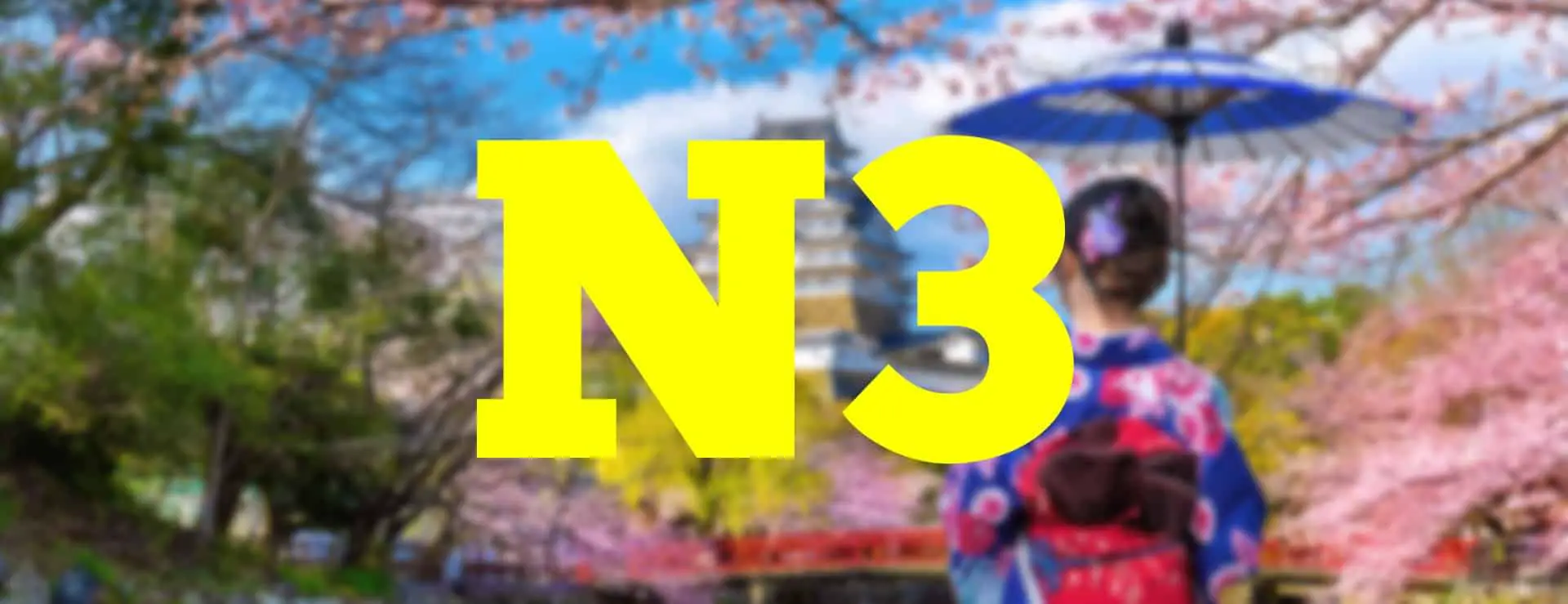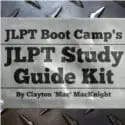N3 is right in the middle of all the tests. It really has no equivalent to the old tests. The best way to look at it is that it tests the easier 50% of what was originally on the level 2 or 2級 test. It requires about 450 hours of classroom study in order to pass, which is about 3 years of college study. If you majored in Japanese in college you should be able to pass this test.
The N3 was mostly created because students were having a difficult time moving up from level 3 to level 2 of the old tests. The N3 was designed to bridge that gap between those two tests. I have to agree that the test really helps focus on some nuances that are not covered in N4, but are required for higher level speaking.
Practice Tests
There are actually three sets of practice tests available for each level of the JLPT. The first set are called ‘sample questions’. These just have two questions for each section. Basically, it is a good way to get a feel for what the test is like and how difficult it is before taking a full practice test. There are also two full practice tests you can download for free as well. The JLPT website refers to these as ‘workbooks’.
JLPT N3 Sample Questions (Download) or Answer them Online
JLPT N3 – Basic Info
The N3 covers intermediate Japanese. You should be able to, of course, understand and use basic Japanese with ease. Also at this level, you should be able to get the general idea of more complicated materials like advertisements and newspaper headlines. You are also able to listen and comprehend the general idea of conversations spoken at near-native speed about daily topics.
In my highly unofficial opinion, the aim of N3 is to test your ability to work in a mainly English-speaking environment where Japanese might be spoken from time to time. If you pass N3, you should be able to live fairly comfortably in Japan. You will be able to have more complex conversations and be able to make plans and express your (simple) opinions easily.
JLPT N3 – Grammar
Most of the grammar lists are pure guesses for N3. Chances are you are going to see a lot more conjunctions at this level. I have been using grammar books that children use in junior high school to prepare for this level. There are also some other lists available on the web that are based on corpus data that might be more accurate, but it is anybody’s guess. Jonathan Waller has a good estimate of the grammar for N3 on his site here.
In general though, look for a lot of different kinds of discourse markers like つまり、そのために、etc… Also, more nuanced grammar points like ~おかげで– thanks to ~ and ~せいで– because of ~ something negative happened. In terms of advanced conjunctions look out for terms like ~に
JLPT N3 – Kanji
The amount of kanji that will be tested on in N3 is approximately 650. This includes the 300 kanji from N5 and N4. So, for N3 you will need to learn an additional 350 or so kanji. The question is, what kanji will be on the test? Again there are a few estimates to go by.
One rule of thumb to go by is the grade levels for kanji, also referred to as kyoiku kanji or 教育漢字. If you are not familiar with the system, certain kanji are taught at certain grades in elementary school. The exact kanji that are studied are set by the Ministry of Education in Japan. They are arranged into 6 grades that correspond to the 6 years of elementary school. For more information on the exact kanji for each level, check out Wikipedia’s list.
The general consensus is that the kanji for N3 correspond to the first 4 levels of this system. If you add the first 4 grade levels together, you get a total of 648 kanji, which is about the same number of kanji that is on the test (650). I would recommend doing drills on these first 4 grade levels in preparation for the exam. Most kanji practicing software has drill decks already set up this way, so it shouldn’t be that difficult.
I do recommend supplementing that with occasionally looking over the higher grades (5 and 6) as well. Even if these higher grades aren’t on the test, you’ll be even more prepared for N2. Also, at this phase of your Japanese study, you should really start doing some more reading. There are a few graded readers available for you to practice your reading skills and these will have kanji in them so you can study kanji at the same time.
JLPT N3 – Vocabulary
There are a approximately 3500 words that you need to know for the N3. Again, there are a lot of estimates out there on the web that are trying to predict what this word list looks like. There are also a few handy books that focus just on the vocabulary for the N3. I personally recommend ASK’s vocabulary book for N3. I’m a big fan of their series of books, but it only has 1200 words in it.
Keep in mind that even if you study every list and you master it, there will still be words on the test that you have never encountered before. You will usually encounter these in the paraphrases and usage sections of the vocabulary test. In my experience, they tend to throw in at least one word that is not on any list. The test is truly designed to measure your proficiency not your ability memorize lists.
The best study strategy is to split your time between studying flashcards or a vocabulary book specifically designed for N3 and doing some reading that doesn’t have anything to do with lists. Like I said earlier you can find some graded readers that will have different vocabulary in them. If you are in Japan, you can visit a used bookstore and grab some books that are aimed at elementary students. These should be your grammar and vocabulary level, and will most likely have furigana (the hiragana above the kanji) to help you read any kanji you can’t recognize.
So, What is this Thing Good for Anyway?
The JLPT N3 is a serious step up. You have at least entered the minor leagues at this point. This is something that you could put on your resume and probably get more interviews because of it. This doesn’t quite give you the ability to work in an all-Japanese environment unless you can backup your test results with some pretty good fluency.
The N3 shows that you are dedicated to learning Japanese and could potentially become fluent with some more practice. If you have other qualifications, this might help you land a job at a Japanese company if you can show that you can communicate with Japanese on a business level. Note however that some companies may automatically turn you away if you don’t have a certain level on the test no matter how qualified or fluent you are.
At this level it will become increasingly more difficult to pass if you live outside of Japan. It’s difficult, but by no means impossible. If you are living outside of Japan, you will need to at least find a Japanese penpal or friend that can help you with the nuances of the test. There are several grammar points that are very similar, but have shades of meaning. The best way to learn about these is to ask native speakers as well as try out the grammar as much as possible and make lots of mistakes until you learn it.
In Summary
The JLPT N3 is the midway point to complete fluency. This stage of learning the language can be very frustrating because you will be able to understand at least 50% of every conversation, but you won’t be able to completely understand. I personally find this to be frustrating because you may want to enter a conversation, but aren’t completely sure that you are understanding what is being talked about. Never fear though, you are making solid progress!
Now it’s your turn to take action. In the comments below, let me know any resources you are using to study for the JLPT N3. Did they help? What would you recommend to someone that is studying for the N3? Don’t be afraid, help your fellow man (and woman) pass the test!












Thank you very much for this! I plan on taking N3 this December and failing, haha. I just wanted something interesting in my college application in case I pass.
You also made me feel a lot better about not being N2-level fluent. I thought anything below N2 is looked down upon, but you saying that N3 is “the midway point to complete fluency” really made my day. Thank you!! I’ll work hard to pass! Even though I’m not done with grade 4 kanji yet ORZ
N3 is no joke. I just passed it this last December and I can say it is good enough to be able to get around, troubleshoot, book hotels, ask for directions, have somewhat simple conversations, even ask about details when shopping. I really don’t have too many issues getting along in Japan. I’m not exactly finished studying Japanese yet, but it’s far from being worthless. And it is good prep for N2, which is a monster of a test.
Good Luck!
“This stage of learning the language can be very frustrating because you will be able to understand at least 50% of every conversation, but you won’t be able to completely understand. I personally find this to be frustrating because you may want to enter a conversation, but aren’t completely sure that you are understanding what is being talked about. ”
It makes me feel soo much better that this happened to someone else too and isn’t just me being slow!
I feel this way a lot especially when people start speaking in heavy kansai-ben. It’s like being at the playground and wanting to play jump rope, but not knowing when to jump in. Definitely frustrating!
Planning on sitting N3 in December (doing N4 in a few weeks) but I’ve already started preparing for N3. Doesn’t seem that bad although you do make a good point: there are a lot of grammar constructs that seem near enough the same but have slightly different nuances making them very different. Forget learning vocab, Kanji or grammar; actually understanding the differences between those nuances and when to use which is what I’m finding the most difficult.
Also, your point on finding a Japanese pen-pal definitely rings true. I started emailing about 4 or 5 Japanese people (that are studying English) a few months ago and it really helps improve your grasp of the language. Words/phrases come to mind much quicker and fluidly. Although I’ve still got a long way to go.
I’m no expert (obviously) but I completely agree that if you’re living outside Japan – and especially if you’re a self-learner – finding a Japanese pen-pal (perhaps one that is learning your native language and is at a similar level to you) early is paramount.
Hi, i have some questions for you..
How much questions does each section (goi, bunpou/dokkai, choukai) have?(an approximate number)
I’m going to take the N3 exam.. on december, so i ou,d like to know that uwu
Thanks.
I have a detailed list of how many questions for each section as well as how much time to spend on each in my JLPT Time Management article:
https://jlptbootcamp.com/2011/06/jlpt-time-time-management-for-the-test/
Should be a big help.
I live in Japan and my proficiency is really weak in grammar but rich in kanji and vocabulary. I’m around an N5-N4 level currently of speaking Japanese. I took a few months off to prepare for the N3. Is there any hope for me? My current study schedule includes 2 hours a day of studying through my tutor, reading, writing a diary, and vocab lists. I project that I will accomplish about 240 hours of study. So my question is if that 450 hours of study is cumulative or after accomplishing the JLPT 4? Thanks <3
Katie
That 450 hours is cumulative classroom hours. And then you have to assume another two hours or so for out of classroom work. I wrote a later post about study hours: https://jlptbootcamp.com/2011/04/jlpt-study-hours-are-they-accurate/
Basically you are looking at about 1000 or more hours total time.
Would you mind telling the names of a few of the Junior High grammar books you used?
This seems like a really good approach to me, but I am not sure where to find them.
Mmm, sorry, it was so long ago, they seem to have run off somewhere. I lost a few things in a recent move. I think I might have given them away actually.
Anyway, if you are in Japan, any medium to big bookstore should have a decent 国語 section that is divided into different levels. N3 is around 小学校 level, the year 6 (6年) material might be too tough, but just crack a few books open and see what you can do. They usually have books for kanji, reading exercises, and some that go over expressions (grammar). Just see what is useful for you and you can work through.
Sorry, I don’t have more information than that.
apparently, i have been using memrise app for n3 vocabulary. i am confused, i have started learning the kanji for the vocabulary list that is crossing 35000. is it a wrong method
What do you mean crossing 35000?
sorry for the typos,..I mean it is 3500